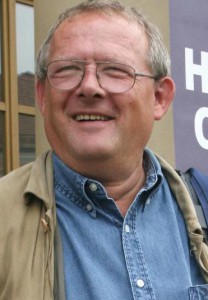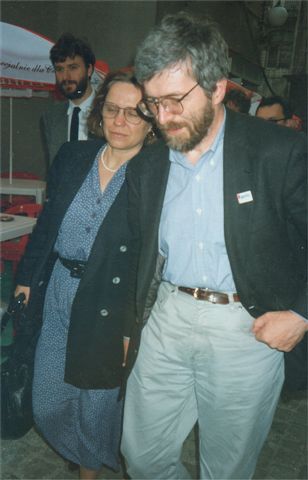
Barańczak and friends.
“There is a Polish poet, Stanisław Barańczak, a professor at Harvard. He was a virtuoso of translation – he translated practically all of Shakespeare, the metaphysical English poets, Emily Dickinson also, and so on. But his own poetry, also, is … equalibristics. He writes rhymed poetry, because his inventiveness in this respect is fantastic.”
So Czesław Miłosz told me fifteen years ago, at his home on Grizzly Peak in Berkeley, as he was musing about his colleague’s “shaman” qualities.
The twentieth century brought untold literary genius to the West. When I say “untold,” I mean it. How many Americans have heard the name Stanisław Barańczak, despite the wealth of poems, translations, and essays he left behind on this side of the Atlantic?

Farewell to a shaman.
After a decades-long fight with Parkinson’s Disease – writing as much as he could, for as long as he could – the Polish genius finally died last year on December 26. He was 68.
A few weeks ago, I received a special edition of the preeminent Polish literary journal, Zeszyty Literackie in my email inbox from its co-founder Barbara Toruńczyk (Barańczak was the other co-founder). The issue is devoted to Barańczak, and includes the eulogies at his January 3, 2015, funeral in Cambridge, along with some of his poems in Polish and English. It is something of a primer for those who don’t know his name. It’s available online here.
Polish journalist, essayist, historian, and former dissident Adam Michnik recounted Barańczak’s history with Solidarity, and his struggle to free his country from the Communist yoke: “He was also a wonderful, brave, and irreverent spirit of his time; he was among the first to get involved in Poland’s democratic opposition movement. He paid for it by getting a publishing ban issued against him, by getting thrown out of the university, and suffering all kinds of repressions. But even his open enemies dared not question his brilliance.” The peril was not from his overlords, but from within: “It was but a narrow escape,” Barańczak said years later. “I could have simply raised my hand as other people did, and simply let it down, as other people did.”

Adam Michnik
Michnik recalled, “He related to people with understanding, but he was steadfast when it came to principles. He had no tolerance for cowardice in the face of dictatorship. This is clear in his poems and essays—any one of them could have landed him in prison.”
“The game is bad because we stand, from the beginning, at a disadvantage; but it would be even worse, if we were to admit that—as a result of the certainty of failure—the game is not only bad, but completely senseless. Acting with dignity in this stupid situation, putting on a brave face, depends on finding some sense within it. We will not defeat our opponent in this way; but we will, at least, throw a stumbling block in his path. Nothingness is keenly interested in propagating the feeling of meaninglessness, which paves the way for its progress and eases its task. Until the very end, Staszek kept erecting stumbling blocks before nothingness.”
“In an essay about Auden, Staszek wrote that poetry ‘is not able to eradicate evil from us. But it allows us, at least, to bring this evil to consciousness. Precisely because we are condemned to the presence of evil within ourselves, we need, all the more, to become conscious of it.’”

Adam Zagajewski
So how did he wind up in Cambridge, Massachusetts? Barańczak spent years applying, unsuccessfully, for a visa, before he finally got one: he accepted the chair in the Slavic Languages and Literature Department at Harvard.
Irena Grudzińska Gross remembers visiting him there: “Although Staszek’s talents, intelligence and industry were somewhat intimidating, those who were lucky enough to know him more intimately were enchanted by his pronouncements on literature, his wit, his modesty and kindness, which he would abandon only when (and these moments were terrible) he encountered a bad translation or a very stupid book. He was a great companion (when one was able to drag him away from his work) on the excursions, organized by [his wife] Ania, to the Massachusetts beaches, historical landmarks, and great open air restaurants. Indoors, it was a great pleasure to listen to the music he loved, to watch over and over the cult movies he and Ania knew by heart: The Godfather, White Sheik or Some Like it Hot.
From Adam Zagajewski:

Stanisław Barańczak with wife Anna (Photo: Mariusz Kubik)
Death deprived us not of a theoretician, nor even of an author—but, above all, of an exceptional human being. Yes, a human being and a poet. On that day, when Stanisław’s funeral was being held in the American Cambridge, the Kraków Opera reopened its production of Winter Journey by Schubert and Barańczak (I like to look at the juxtaposition of these two names). Those, who could not fly to Boston, gathered together in the red chamber hall of the opera and listened to the songs of Franz Schubert, to which Stanisław had written poems—poems that were exquisite, simultaneously mystical and cabaret-esque, tragic and funny. The baritone Andrzej Biegun sang beautifully. It seems to me that I was not the only one for whom this was an extraordinary experience, and not only because I knew, we knew, that in the same moment, at the Mount Auburn cemetery in Cambridge, a crowd of Stanisław’s friends had gathered to farewell him.
It was as if two completely different generations, one hundred and fifty years apart, embedded in different countries, in different eon and languages, condemned never to meet—Franz Schubert, an artist of the era of tailcoats and candles, of cannons and diplomatic lies, a witness to the Congress of Vienna, and Stanisław, living in the shadow of Yalta and Potsdam, in the shadow of lies even more monstrous, systematic and triumphant, in the shadow of an incurable illness—united themselves that afternoon in an ideal artistic form. They met in the great, sweet melancholy of art, in a sadness made mild by perfection of form and expression, by the bitter joy granted to us by wonder, however brief. A tragic wonder, which for a moment allows us, almost, to accept joyfully something which cannot be accepted—the fact that everything perishes in the cold fire of time, the most patient of killers.
President of Poland, Bronisław Komorowski said at the memorial that “choosing to remain abroad, he ceased to be a refugee from Poland, emerging instead as the country’s untiring ambassador.”
 You still think genius is overstating the case? Here’s what Nobelist Joseph Brodsky said to fellow Nobelist Miłosz on the subject, in the interview between the two included in Czesław Miłosz: Conversations:
You still think genius is overstating the case? Here’s what Nobelist Joseph Brodsky said to fellow Nobelist Miłosz on the subject, in the interview between the two included in Czesław Miłosz: Conversations:
Brodsky: The boy is a genius, Stasiek, ya?
Miłosz: Fantastic.
Brodsky: A fantastic genius, indeed.
Can’t quarrel with that. Read the whole thing here.
Tags: Adam Michnik, Adam Zagajewski, Barbara Toruńczyk, Bronisław Komorowski, Czeslaw Milosz, Franz Schubert, Irena Grudzińska Gross, Stanisław Barańczak

